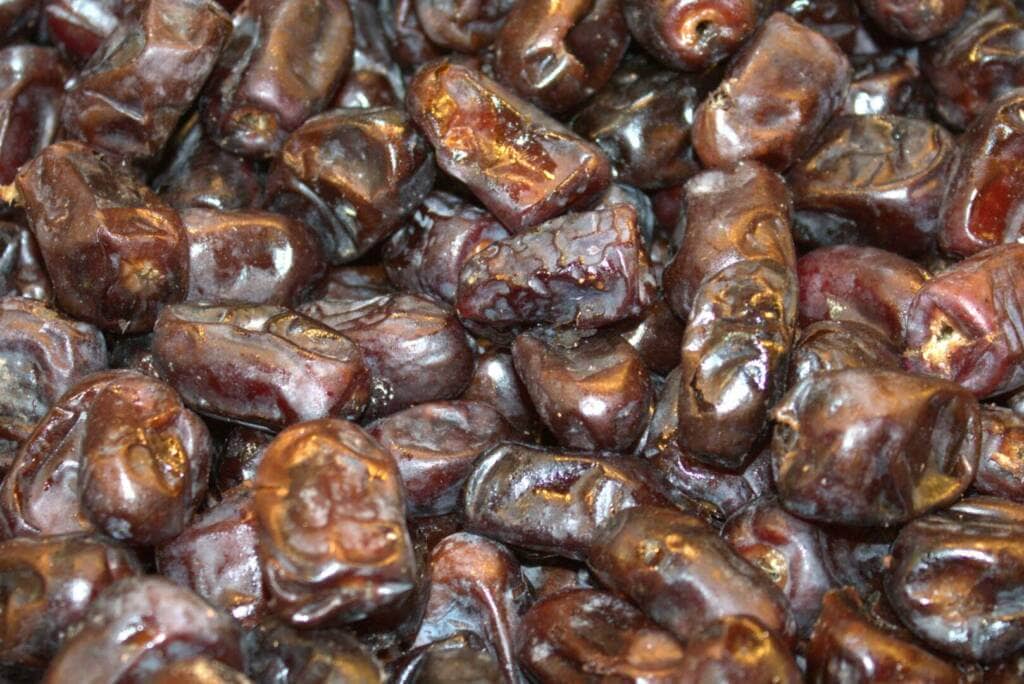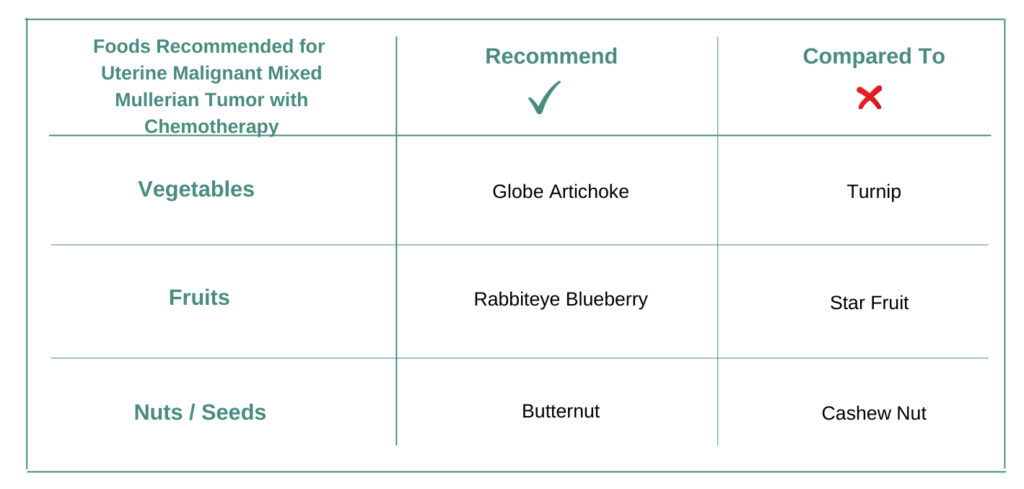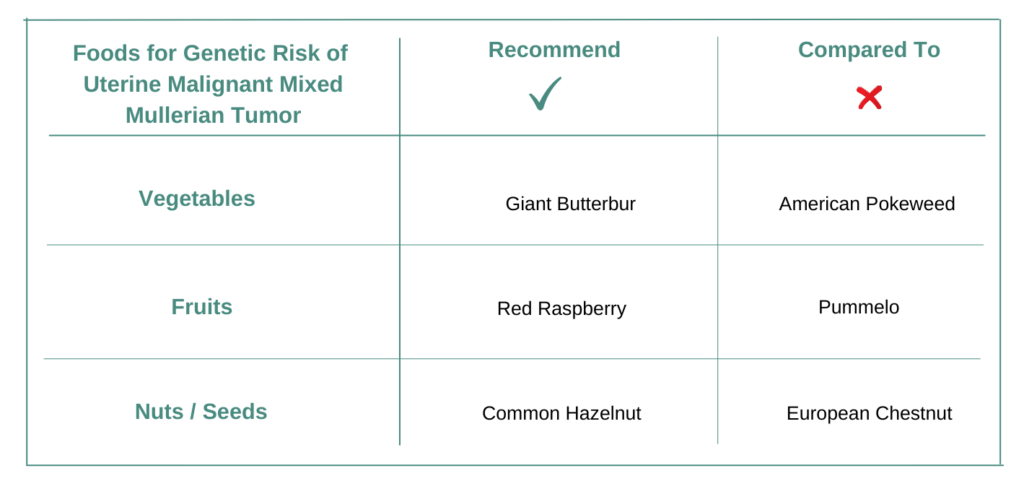Introduction
Foods for Uterine Malignant Mixed Mullerian Tumor should be personalized for each individual and also must adapt when cancer treatment or tumor genetic change. The personalization and adaptation must consider all the active ingredients or bioactives contained in different foods with respect to cancer tissue biology, genetics, treatments, lifestyle conditions and diet preferences. Hence while nutrition is one of the very important decisions for a cancer patient and individual at risk of cancer to make – how to choose foods to eat is not an easy task.
Malignant mixed Müllerian tumors (MMMT), also known as uterine carcinosarcomas, are rare and aggressive forms of cancer that occur primarily in the uterus but can also be found in the ovary. These tumors represent a mix of sarcoma and carcinoma elements, making their pathology, as detailed in malignant mixed Müllerian tumor pathology outlines, particularly complex. The histology of MMMT often reveals diverse tissue types, an aspect that is crucial for diagnosis and treatment planning. Understanding the malignant mixed Müllerian tumor of the uterus and its counterpart in the ovary is essential for determining the appropriate management approach.
The prognosis of malignant mixed Müllerian tumors varies, with the survival rate largely depending on the stage at diagnosis and the response to treatment. The treatment for malignant mixed Müllerian tumor typically involves a combination of surgery, chemotherapy, and sometimes radiation therapy. Immunohistochemistry plays a key role in diagnosing these tumors, helping to differentiate them from other types of uterine and ovarian cancers.
Symptoms of malignant mixed Müllerian tumors can be nonspecific, which sometimes leads to delays in diagnosis. Radiological imaging, as outlined in malignant mixed Müllerian tumor radiology, is instrumental in assessing the extent of the disease. The ICD-10 classification for malignant mixed Müllerian tumor of the uterus is a crucial aspect of medical documentation and insurance processing.
Understanding what is malignant mixed Müllerian tumor and its various aspects, including malignant mixed Müllerian tumor chemotherapy and its effectiveness, is vital for patients and healthcare providers. The term “carcinosarcoma” is often used interchangeably with MMMT, highlighting the dual nature of these tumors. Despite the challenges in treating these aggressive tumors, ongoing research and advancements in medical science offer hope for better outcomes in the future.
For Uterine Malignant Mixed Mullerian Tumor does it matter what vegetables, fruits, nuts, seeds one eats?
A very common nutrition question asked by cancer patients and individuals at-genetic risk of cancer is – for cancers like Uterine Malignant Mixed Mullerian Tumor does it matter what foods I eat and which I do not? Or if I follow a plant-based diet is that enough for cancer like Uterine Malignant Mixed Mullerian Tumor?
For example does it matter if vegetable Globe Artichoke is consumed more compared to Turnip? Does it make any difference if fruit Star Fruit is preferred over Rabbiteye Blueberry? Also if similar choices are made for nuts/seeds like Butternut over Cashew Nut and for pulses like Broad Bean over Lima Bean. And if what I eat matters – then how does one identify foods which are recommended for Uterine Malignant Mixed Mullerian Tumor and is it the same answer for everyone with the same diagnosis or genetic risk?
Yes! Foods you eat matters for Uterine Malignant Mixed Mullerian Tumor!
Food recommendations may not be the same for everyone and can be different even for the same diagnosis and genetic risk.

All foods (vegetables, fruits, nuts, seeds, pulses, oils etc.) and nutritional supplements are made up of more than one active molecular ingredient or bio-actives in different proportions and quantities. Each active ingredient has a unique mechanism of action – which can be activation or inhibition of different biochemical pathways. Simply stated foods and supplements which are recommended are those which do not cause an increase of molecular drivers of cancer but reduce them. Else those foods should not be recommended. Foods contain multiple active ingredients – hence when evaluating foods and supplements you need to consider the impact of all active ingredients cumulatively rather than individually.
For example Star Fruit contains active ingredients Curcumin, Apigenin, Genistein, Myricetin, Delphinidin. And Rabbiteye Blueberry contains active ingredients Quercetin, Linalool, P-coumaric Acid, Eugenol, Gallic Acid and possibly others.
A common mistake made when deciding and choosing foods to eat for Uterine Malignant Mixed Mullerian Tumor – is to evaluate only selected active ingredients contained in foods and ignore the rest. Because different active ingredients contained in foods may have opposing effects on cancer drivers – you cannot cherry pick active ingredients in foods and supplements for making a nutrition decision for Uterine Malignant Mixed Mullerian Tumor.
YES – FOOD CHOICES MATTER FOR CANCER. NUTRITION DECISIONS MUST CONSIDER ALL ACTIVE INGREDIENTS OF FOODS.
Skills Needed for Nutrition Personalization for Uterine Malignant Mixed Mullerian Tumor?
Personalized nutrition for cancers like Uterine Malignant Mixed Mullerian Tumor consists of recommended foods / supplements; not recommended foods / supplements with example recipes which prioritize use of recommended foods. An example of personalized nutrition can be seen at this link.
Deciding which foods are recommended or not is extremely complicated, requiring expertise in Uterine Malignant Mixed Mullerian Tumor biology, food science, genetics, biochemistry along with good understanding of how cancer treatments work and associated vulnerabilities by which the treatments could stop being effective.
MINIMUM KNOWLEDGE EXPERTISE NEEDED FOR NUTRITION PERSONALIZATION FOR CANCER ARE: CANCER BIOLOGY, FOOD SCIENCE, CANCER TREATMENTS AND GENETICS.
Foods to Eat After Cancer Diagnosis!
No two cancers are the same. Go beyond the common nutrition guidelines for everyone and make personalized decisions about food and supplements with confidence.
Characteristics of cancers like Uterine Malignant Mixed Mullerian Tumor
All cancers like Uterine Malignant Mixed Mullerian Tumor can be characterized by a unique set of biochemical pathways – the signature pathways of Uterine Malignant Mixed Mullerian Tumor. Biochemical pathways like Growth Factor Signaling, Extracellular Matrix Remodelling, PI3K-AKT-MTOR Signaling, MAPK Signaling are part of the signature definition of Uterine Malignant Mixed Mullerian Tumor. Each individual’s cancer genetics can be different and hence their specific cancer signature could be unique.
The treatments which are effective for Uterine Malignant Mixed Mullerian Tumor need to be cognizant of the associated signature biochemical pathways for each cancer patient and individual at genetic risk. Therefore different treatments with different mechanisms of actions are effective for different patients. Similarly and for the same reasons foods and supplements need to be personalized for each individual. Hence some foods and supplements are recommended for Uterine Malignant Mixed Mullerian Tumor when taking cancer treatment Crizotinib, and some foods and supplements are not recommended.
Sources like cBioPortal and many others provide population representative patient anonymized data from clinical trials for all cancer indications. This data consists of clinical trial study details like sample size / number of patients, age groups, gender, ethnicity, treatments, tumor site and any genetic mutations.
TP53, PIK3CA, KRAS, FBXW7 and PIK3R1 are the top ranked reported genes for Uterine Malignant Mixed Mullerian Tumor. TP53 is reported in 14.4 % of the representative patients across all clinical trials. And PIK3CA is reported in 5.5 %. The combined population patient data cover ages from 44 to 84. 0.0 % of the patient data are identified as men. The Uterine Malignant Mixed Mullerian Tumor biology along with reported genetics together define the population represented signature biochemical pathways for this cancer. If the individual cancer tumor genetics or genes contributing to the risk are also known then that should also be used for nutrition personalization.
NUTRITION CHOICES SHOULD MATCH WITH EACH INDIVIDUAL’S CANCER SIGNATURE.
Food and Supplements for Uterine Malignant Mixed Mullerian Tumor
For Cancer Patients
Cancer patients on treatment or on palliative care need to make decisions on food and supplements – for the needed dietary calories, for managing any treatment side effects and also for improved cancer management. All plant-based foods are not equal and choosing and prioritizing foods which are personalized and customized to ongoing cancer treatment is important and complicated. Here are some examples providing guidelines for making nutrition decisions.
Choose Vegetable GLOBE ARTICHOKE or TURNIP?
Vegetable Globe Artichoke contains many active ingredients or bioactives such as Curcumin, Apigenin, Genistein, Myricetin, Delphinidin. These active ingredients manipulate various biochemical pathways like Inflammation, MYC Signaling, Heat Stress Response and PI3K-AKT-MTOR Signaling and others. Globe Artichoke is recommended for Uterine Malignant Mixed Mullerian Tumor when ongoing cancer treatment is Crizotinib. This is because Globe Artichoke modifies those biochemical pathways which have been scientifically reported to sensitize the effect of Crizotinib.
Some of the active ingredients or bioactives in vegetable Turnip are Quercetin, Ellagic Acid, Curcumin, Sulforaphane, Genistein. These active ingredients manipulate various biochemical pathways like Extracellular Matrix Remodelling and Heat Stress Response and others. Turnip is not recommended for Uterine Malignant Mixed Mullerian Tumor when ongoing cancer treatment is Crizotinib because it modifies those biochemical pathways which make the cancer treatment resistant or less responsive.
VEGETABLE GLOBE ARTICHOKE IS RECOMMENDED OVER TURNIP FOR Uterine Malignant Mixed Mullerian Tumor AND TREATMENT Crizotinib.
Choose Fruit RABBITEYE BLUEBERRY or STAR FRUIT?
Fruit Rabbiteye Blueberry contains many active ingredients or bioactives such as Quercetin, Linalool, P-coumaric Acid, Eugenol, Gallic Acid. These active ingredients manipulate various biochemical pathways like Metastasis, Inflammation, P53 Signaling and Microtubule Dynamics and others. Rabbiteye Blueberry is recommended for Uterine Malignant Mixed Mullerian Tumor when ongoing cancer treatment is Crizotinib. This is because Rabbiteye Blueberry modifies those biochemical pathways which have been scientifically reported to sensitize the effect of Crizotinib.
Some of the active ingredients or bioactives in fruit Star Fruit are Curcumin, Apigenin, Genistein, Myricetin, Delphinidin. These active ingredients manipulate various biochemical pathways like Epithelial to Mesenchymal Transition and Heat Stress Response and others. Star Fruit is not recommended for Uterine Malignant Mixed Mullerian Tumor when ongoing cancer treatment is Crizotinib because it modifies those biochemical pathways which make the cancer treatment resistant or less responsive.
FRUIT RABBITEYE BLUEBERRY IS RECOMMENDED OVER STAR FRUIT FOR Uterine Malignant Mixed Mullerian Tumor AND TREATMENT Crizotinib.
Choose Nut BUTTERNUT or CASHEW NUT?
Butternut contains many active ingredients or bioactives such as Curcumin, Apigenin, Lycopene, Genistein, Myricetin. These active ingredients manipulate various biochemical pathways like Epithelial to Mesenchymal Transition, Inflammation, P53 Signaling and Heat Stress Response and others. Butternut is recommended for Uterine Malignant Mixed Mullerian Tumor when ongoing cancer treatment is Crizotinib. This is because Butternut modifies those biochemical pathways which have been scientifically reported to sensitize the effect of Crizotinib.
Some of the active ingredients or bioactives in Cashew Nut are Quercetin, Curcumin, Myricetin, Delphinidin, Caffeic Acid. These active ingredients manipulate various biochemical pathways like MAPK Signaling, Inflammation and Heat Stress Response and others. Cashew Nut is not recommended for Uterine Malignant Mixed Mullerian Tumor when ongoing cancer treatment is Crizotinib because it modifies those biochemical pathways which make the cancer treatment resistant or less responsive.
BUTTERNUT IS RECOMMENDED OVER CASHEW NUT FOR Uterine Malignant Mixed Mullerian Tumor AND TREATMENT Crizotinib.

For Individuals with Genetic Risk of Cancer
The question asked by individuals who have genetic risk of Uterine Malignant Mixed Mullerian Tumor or familial history is “What Should I Eat Differently from Before?” and how they should choose foods and supplements to manage risks of the disease. Since for cancer risk there is nothing actionable in terms of treatment – decisions of foods and supplements become important and one of the very few actionable things which can be done. All plant-based foods are not equal and based on identified genetics and pathway signature – the choices of food and supplements should be personalized.
Choose Vegetable GIANT BUTTERBUR or AMERICAN POKEWEED?
Vegetable Giant Butterbur contains many active ingredients or bioactives such as Curcumin, Catechol, Myricetin, Delphinidin, Apigenin. These active ingredients manipulate various biochemical pathways like DAP12 Signaling, Angiogenesis, Inositol Phosphate Signaling and Hematopoiesis and others. Giant Butterbur is recommended for risk of Uterine Malignant Mixed Mullerian Tumor when associated genetic risk is FBXW7. This is because Giant Butterbur increases those biochemical pathways which counteract the signature drivers of it.
Some of the active ingredients or bioactives in vegetable American Pokeweed are Quercetin, Curcumin, Catechol, Myricetin, Delphinidin. These active ingredients manipulate various biochemical pathways like Oxidative Stress and others. American Pokeweed is not recommended when risk of Uterine Malignant Mixed Mullerian Tumor when associated genetic risk is FBXW7 because it increases the signature pathways of it.
VEGETABLE GIANT BUTTERBUR IS RECOMMENDED OVER AMERICAN POKEWEED FOR FBXW7 GENETIC RISK OF CANCER.
Choose Fruit RED RASPBERRY or PUMMELO?
Fruit Red Raspberry contains many active ingredients or bioactives such as Quercetin, Ellagic Acid, Curcumin, Catechol, Delphinidin. These active ingredients manipulate various biochemical pathways like MYC Signaling, Angiogenesis, Inositol Phosphate Signaling and Hematopoiesis and others. Red Raspberry is recommended for risk of Uterine Malignant Mixed Mullerian Tumor when associated genetic risk is FBXW7. This is because Red Raspberry increases those biochemical pathways which counteract the signature drivers of it.
Some of the active ingredients or bioactives in fruit Pummelo are Quercetin, Curcumin, Catechol, Delphinidin, Apigenin. These active ingredients manipulate various biochemical pathways like Oxidative Stress and others. Pummelo is not recommended when risk of Uterine Malignant Mixed Mullerian Tumor when associated genetic risk is FBXW7 because it increases the signature pathways of it.
FRUIT RED RASPBERRY IS RECOMMENDED OVER PUMMELO FOR FBXW7 GENETIC RISK OF CANCER.
Choose Nut COMMON HAZELNUT or EUROPEAN CHESTNUT?
Common Hazelnut contains many active ingredients or bioactives such as Quercetin, Curcumin, Catechol, Myricetin, Delphinidin. These active ingredients manipulate various biochemical pathways like MYC Signaling, Angiogenesis, MAPK Signaling and Hematopoiesis and others. Common Hazelnut is recommended for risk of Uterine Malignant Mixed Mullerian Tumor when associated genetic risk is FBXW7. This is because Common Hazelnut increases those biochemical pathways which counteract the signature drivers of it.
Some of the active ingredients or bioactives in European Chestnut are Quercetin, Ellagic Acid, Curcumin, Catechol, Myricetin. These active ingredients manipulate various biochemical pathways like Oxidative Stress and others. European Chestnut is not recommended when risk of Uterine Malignant Mixed Mullerian Tumor when associated genetic risk is FBXW7 because it increases the signature pathways of it.
COMMON HAZELNUT IS RECOMMENDED OVER EUROPEAN CHESTNUT FOR FBXW7 GENETIC RISK OF CANCER.

In Conclusion
Foods and Supplements chosen are important decisions for cancers like Uterine Malignant Mixed Mullerian Tumor. Uterine Malignant Mixed Mullerian Tumor patients and individuals with genetic-risk always have this question: “What foods and nutritional supplements are recommended for me and which are not?” There is a common belief which is a misconception that all plant-based foods could be beneficial or not but would not be harmful. Certain foods and supplements can interfere with cancer treatments or promote molecular pathway drivers of cancer.
There are different types of cancer indications like Uterine Malignant Mixed Mullerian Tumor, each with different tumor genetics with further genomic variations across each individual. Further every cancer treatment and chemotherapy has a unique mechanism of action. Each food like Globe Artichoke contains various bioactives in different quantities, which have an impact on different and distinct sets of biochemical pathways. The definition of personalized nutrition is individualized food recommendations for the cancer indication, treatments, genetics, lifestyle and other factors. Nutrition personalization decisions for cancer require knowledge of cancer biology, food science and an understanding of different chemotherapy treatments. Finally when there are treatment changes or new genomics is identified – the nutrition personalization needs re-evaluation.
The addon nutrition personalization solution makes the decision making easy and removes all the guesswork in answering the question, “What foods should I choose or not choose for Uterine Malignant Mixed Mullerian Tumor?”. The addon multi-disciplinary team includes cancer physicians, clinical scientists, software engineers and data scientists.
Personalized Nutrition for Cancer!
Cancer changes with time. Customize and modify your nutrition based on cancer indication, treatments, lifestyle, food preferences, allergies and other factors.
References
- Msk Impact 2017
- Genomic analyses of gynaecologic carcinosarcomas reveal frequent mutations in chromatin remodelling genes.
- Gallic acid abolishes the EGFR/Src/Akt/Erk-mediated expression of matrix metalloproteinase-9 in MCF-7 breast cancer cells.
- L-Ascorbic Acid Inhibits Breast Cancer Growth by Inducing IRE/JNK/CHOP-Related Endoplasmic Reticulum Stress-Mediated p62/SQSTM1 Accumulation in the Nucleus.
- Chlorogenic-induced inhibition of non-small cancer cells occurs through regulation of histone deacetylase 6.
- Research progress on the anticancer effects of vitamin K2.
- Molecular targets and anticancer potential of indole-3-carbinol and its derivatives.
- Lycopene Inhibits Activation of Epidermal Growth Factor Receptor and Expression of Cyclooxygenase-2 in Gastric Cancer Cells.
